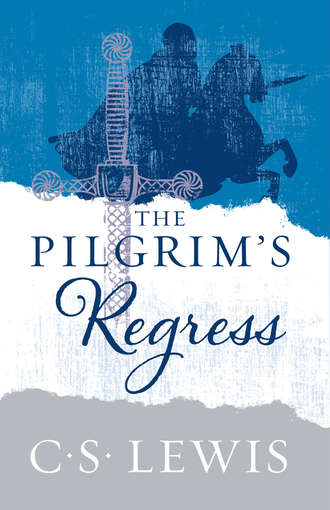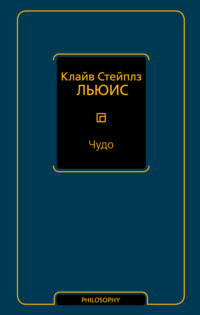
Полная версия
The Pilgrim’s Regress
‘It was me you wanted,’ said the brown girl. ‘I am better than your silly Islands.’
And John rose and caught her, all in haste, and committed fornication with her in the wood.
5
ICHABOD
The deception does not last: but it leaves a habit of sin behind it
After that John was always going to the wood. He did not always have his pleasure of her in the body, though it often ended that way: sometimes he would talk to her about himself, telling her lies about his courage and his cleverness. All that he told her she remembered, so that on other days she could tell it over to him again. Sometimes, even, he would go with her through the wood looking for the sea and the Island, but not often. Meanwhile the year went on and the leaves began to fall in the wood and the skies were more often grey: until now, as I dreamed, John had slept in the wood, and he woke up in the wood. The sun was low and a blustering wind was stripping the leaves from the branches. The girl was still there and the appearance of her was hateful to John: and he saw that she knew this, and the more she knew it the more she stared at him, smiling. He looked round and saw how small the wood was after all – a beggarly strip of trees between the road and a field that he knew well. Nowhere in sight was there anything that he liked at all.
‘I shall not come back here,’ said John. ‘What I wanted is not here. It wasn’t you I wanted, you know.’
‘Wasn’t it?’ said the brown girl. ‘Then be off. But you must take your family with you.’
With that she put up her hands to her mouth and called. Instantly from behind every tree there slipped out a brown girl: each of them was just like herself: the little wood was full of them.
‘What are these?’
‘Our daughters,’ said she. ‘Did you not know you were a father? Did you think I was barren, you fool? And now, children,’ she added, turning to the mob, ‘go with your father.’
Suddenly John became very much afraid and leaped over the wall into the road. There he ran home as fast as he could.
6
QUEM QUAERITIS IN SEPULCHRO? NON EST HIC
Sin and the Law torment John, each aggravating the other – Sweet Desire returns and he resolves to make it the object of his life
From that day forth until he left his home John was not happy. First of all the weight of all the rules that he had broken descended upon him: for while he was going daily to the wood he had almost forgotten the Landlord, and now suddenly the whole reckoning was to pay. In the second place, his last sight of the Island was now so long ago that he had forgotten how to wish for it even, and almost how to set about looking for it. At first he feared to go back to the window in the wall, lest he should meet the brown girl: but he soon found that her family were so constantly with him that place made no difference. Wherever he sat down to rest on a walk, there sooner or later, would be a little brown girl beside him. When he sat of an evening with his father and mother, a brown girl, visible only to him, would sidle in and sit at his feet: and sometimes his mother would fix her eyes on him and even ask him what he was staring at. But most of all they plagued him whenever he had a fit of fright about the Landlord and the black hole. It was always the same. He would wake one morning full o f fear, and take down his card and read it – the front of it – and determine that today he would really begin to keep the rules. And for that day he would, but the strain was intolerable. He used to comfort himself by saying, It will get more easy as I go on. Tomorrow it will be easier. But tomorrow was always harder, and on the third day it was worst of all. And on that third day when he crept away to bed, tired to death and raw in his soul, always he would be sure to find a brown girl waiting for him there: and on such a night he had no spirit to resist her blandishments.
But when he perceived that no place was more, or less, haunted than another, then he came sidling back to the window in the wall. He had little hopes of it. He visited it more as a man visits a grave. It was full winter now, and the grove was naked and dark, the trees dripped in it, and the stream – he saw now that it was little more than a gutter – was full of dead leaves and mud. The wall, too, was broken where he had jumped over it. Yet John stood there a long time, many a winter evening, looking in. And he seemed to himself to have reached the bottom of misery.
One night he was trudging home from it, when he began to weep. He thought of that first day when he had heard the music and seen the Island: and the longing, not now for the Island itself, but for that moment when he had so sweetly longed for it, began to swell up in a warm wave, sweeter, sweeter, till he thought he could bear no more, and then yet sweeter again, till on the top of it, unmistakably, there came the short sound of music, as if a string had been plucked or a bell struck once. At the same moment a coach had gone past him. He turned and looked after it, in time to see a head even then being withdrawn from the window: and he thought he heard a voice say, Come. And far beyond the coach, among the hills of the western horizon, he thought that he saw a shining sea, and a faint shape of an Island, not much more than a cloud. It was nothing compared with what he had seen the first time: it was so much further away. But his mind was made up. That night he waited till his parents were asleep, and then, putting some few needments together, he stole out by the back door and set his face to the West to seek for the Island.
BOOK 2
THRILL
Thou shalt not make to thyself any graven image, nor the likeness of anything that is in the heaven above.
EXODUS
The soul of man, therefore, desiring to learn what manner of things these are, casteth her eyes upon objects akin to herself, whereof none sufficeth. And then it is that she saith, ‘With the Lord and with the things whereof I spoke, there is nothing in that likeness; what then is it like?’ This is the question, oh son of Dionysius, that is the cause of all evils – or rather the travail wherein the soul travaileth about it.
PLATO1
Following false copies of the good, that no Sincere fulfilment of their promise make.
DANTE
In hand she boldly took To make another like the former dame, Another Florimell in shape and look So lively and so like that many it mistook.
SPENSER
1 Some think it wrongly attributed to him.
1
DIXIT INSIPIENS
John begins to think for himself and meets Nineteenth Century Rationalism, which can explain away religion by any number of methods – ‘Evolution’ and ‘Comparative Religion’, and all the guess-work which masquerades as ‘Science’
Still I lay dreaming in bed, and looked, and I saw John go plodding along the road westward in the bitter black of a frosty night. He walked so long that the morning broke. Then presently John saw a little inn by the side of the road and a woman with a broom who had opened the door and was sweeping out the rubbish. So he turned in there and called for a breakfast, and while it was cooking he sat down in a hard chair by the newly-lit fire and fell asleep. When he woke the sun was shining in through the window and there was his breakfast laid. Another traveller was already eating: he was a big man with red hair and a red stubble on all his three chins, buttoned up very tight. When they had both finished the traveller rose and cleared his throat and stood with his back to the fire. Then he cleared his throat again and said:
‘A fine morning, young sir.’
‘Yes, sir,’ said John.
‘You are going West, perhaps, young man?’
‘I – I think so.’
‘It is possible that you don’t know me.’
‘I am a stranger here.’
‘No offence,’ said the stranger. ‘My name is Mr Enlightenment, and I believe it is pretty generally known. I shall be happy to give you my assistance and protection as far as our ways lie together.’
John thanked him very much for this and when they went out from the inn there was a neat little trap waiting, with a fat little pony between the shafts: and its eyes were so bright and its harness was so well polished that it was difficult to say which was twinkling the keener in the morning sunshine. They both got into the trap and Mr Enlightenment whipped up the fat little pony and they went bowling along the road as if nobody had a care in the world. Presently they began to talk.
‘And where might you come from, my fine lad?’ said Mr Enlightenment.
‘From Puritania, sir,’ said John.
‘A good place to leave, eh?’
‘I am so glad you think that,’ cried John. ‘I was afraid –’
‘I hope I am a man of the world,’ said Mr Enlightenment. ‘Any young fellow who is anxious to better himself may depend on finding sympathy and support in me. Puritania! Why, I suppose you have been brought up to be afraid of the Landlord.’
‘Well, I must admit I sometimes do feel rather nervous.’
‘You may make your mind easy, my boy. There is no such person.’
‘There is no Landlord?’
‘There is absolutely no such thing – I might even say no such entity – in existence. There never has been and never will be.’
‘And this is absolutely certain?’ cried John; for a great hope was rising in his heart.
‘Absolutely certain. Look at me, young man. I ask you – do I look as if I was easily taken in?’
‘Oh, no,’ said John hastily. ‘I was just wondering, though. I mean – how did they all come to think there was such a person?’
‘The Landlord is an invention of those Stewards. All made up to keep the rest of us under their thumb: and of course the Stewards are hand in glove with the police. They are a shrewd lot, those Stewards. They know which side their bread is buttered on, all right. Clever fellows. Damn me, I can’t help admiring them.’
‘But do you mean that the Stewards don’t believe it themselves?’
‘I dare say they do. It is just the sort of cock and bull story they would believe. They are simple old souls most of them – just like children. They have no knowledge of modern science and they would believe anything they were told.’
John was silent for a few minutes. Then he began again:
‘But how do you know there is no Landlord?’
‘Christopher Columbus, Galileo, the earth is round, invention of printing, gunpowder!!’ exclaimed Mr Enlightenment in such a loud voice that the pony shied.
‘I beg your pardon,’ said John.
‘Eh?’ said Mr Enlightenment.
‘I didn’t quite understand,’ said John.
‘Why, it’s as plain as a pikestaff,’ said the other. ‘Your people in Puritania believe in the Landlord because they have not had the benefits of a scientific training. For example, now, I dare say it would be news to you to hear that the earth was round – round as an orange, my lad!’
‘Well, I don’t know that it would,’ said John, feeling a little disappointed. ‘My father always said it was round.’
‘No, no, my dear boy,’ said Mr Enlightenment, ‘you must have misunderstood him. It is well known that everyone in Puritania thinks the earth flat. It is not likely that I should be mistaken on such a point. Indeed, it is out of the question. Then again, there is the palaeontological evidence.’
‘What’s that?’
‘Why, they tell you in Puritania that the Landlord made all these roads. But that is quite impossible for old people can remember the time when the roads were not nearly so good as they are now. And what is more, scientists have found all over the country the traces of old roads running in quite different directions. The inference is obvious.’
John said nothing.
‘I said,’ repeated Mr Enlightenment, ‘that the inference was obvious.’
‘Oh, yes, yes, of course,’ said John hastily, turning a little red.
‘Then again, there is anthropology.’
‘I’m afraid I don’t know –’
‘Bless me, of course you don’t. They don’t mean you to know. An anthropologist is a man who goes round your backward villages in these parts, collecting the odd stories that the country people tell about the Landlord. Why, there is one village where they think he has a trunk like an elephant. Now anyone can see that that couldn’t be true.’
‘It is very unlikely.’
‘And what is better still, we know how the villagers came to think so. It all began by an elephant escaping from the local zoo; and then some old villager – he was probably drunk – saw it wandering about on the mountain one night, and so the story grew up that the Landlord had a trunk.’
‘Did they catch the elephant again?’
‘Did who?’
‘The anthropologists.’
‘Oh, my dear boy, you are misunderstanding. This happened long before there were any anthropologists.’
‘Then how do they know?’
‘Well, as to that … I see that you have a very crude notion of how science actually works. To put it simply – for, of course, you could not understand the technical explanation – to put it simply, they know that the escaped elephant must have been the source of the trunk story because they know that an escaped snake must have been the source of the snake story in the next village – and so on. This is called the inductive method. Hypothesis, my dear young friend, establishes itself by a cumulative process: or, to use popular language, if you make the same guess often enough it ceases to be a guess and becomes a Scientific Fact.’
After he had thought for a while, John said:
‘I think I see. Most of the stories about the Landlord are probably untrue; therefore the rest are probably untrue.’
‘Well, that is as near as a beginner can get to it, perhaps. But when you have had a scientific training you will find that you can be quite certain about all sorts of things which now seem to you only probable.’
By this time the fat little pony had carried them several miles, and they had come to a place where a by-road went off to the right. ‘If you are going West, we must part here,’ said Mr Enlightenment, drawing up. ‘Unless perhaps you would care to come home with me. You see that magnificent city?’ John looked down by the by-road and saw in a flat plain without any trees a huge collection of corrugated iron huts, most of which seemed rather old and rusty.
‘That,’ said Mr Enlightenment, ‘is the city of Claptrap. You will hardly believe me when I say that I can remember it as a miserable village. When I first came here it had only forty inhabitants: it now boasts a population of twelve million, four hundred thousand, three hundred and sixty-one souls, who include, I may add, the majority of our most influential publicists and scientific popularisers. In this unprecedented development I am proud to say that I have borne no small part: but it is no mock modesty to add that the invention of the printing press has been more important than any merely personal agency. If you would care to join us –’
‘Well, thank you,’ said John, ‘but I think I will keep to the main road a little longer.’
He got out of the trap and turned to bid good-bye to Mr Enlightenment. Then a sudden thought came into his head, and he said:
‘I am not sure that I have really understood all your arguments, sir. Is it absolutely certain that there is no Landlord?’
‘Absolutely. I give you my word of honour.’
With these words they shook hands. Mr Enlightenment turned the pony’s head up the by-road, gave it a touch with the whip, and in a few moments was out of sight.
2
THE HILL
John abandons his religion with profound relief – And forthwith has his first explicitly moral experience
Then I saw John bounding forward on his road so lightly that before he knew it he had come to the top of a little hill. It was not because the hill had tired him that he stopped there, but because he was too happy to move. ‘There is no Landlord,’ he cried. Such a weight had been lifted from his mind that he felt he could fly. All round him the frost was gleaming like silver; the sky was like blue glass; a robin sat in the hedge beside him; a cock was crowing in the distance. ‘There is no Landlord.’ He laughed when he thought of the old card of rules hung over his bed in the bedroom, so low and dark, in his father’s house. ‘There is no Landlord. There is no black hole.’ He turned and looked back on the road he had come by: and when he did so he gasped with joy. For there in the East, under the morning light, he saw the mountains heaped up to the sky like clouds, green and violet and dark red; shadows were passing over the big rounded slopes, and water shone in the mountain pools, and up at the highest of all the sun was smiling steadily on the ultimate crags. These crags were indeed so shaped that you could easily take them for a castle: and now it came into John’s head that he had never looked at the mountains before, because as long as he thought that the Landlord lived there, he had been afraid of them. But now that there was no Landlord he perceived that they were beautiful. For a moment he almost doubted whether the Island could be more beautiful, and whether he would not be wiser to go East, instead of West. But it did not seem to him to matter, for he said, ‘If the world has the mountains at one end and the Island at the other, then every road leads to beauty, and the world is a glory among glories.’
At that moment he saw a man walking up the hill to meet him. Now I knew in my dream that this man’s name was Mr Vertue, and he was about of an age with John, or a little older.
‘What is the name of this place?’ said John.
‘It is called Jehovah-Jirah,’ said Mr Vertue.
Then they both turned and continued their journey to the West. After they had gone a little way Mr Vertue stole a glance at John’s face and then he smiled a little.
‘Why do you smile?’ said John.
‘I was thinking that you looked very glad.’
‘So would you be if you had lived in the fear of a Landlord all your life and had just discovered that you were a free man.’
‘Oh, it’s that, is it?’
‘You don’t believe in the Landlord, do you?’
‘I know nothing about him – except by hearsay like the rest of us.’
‘You wouldn’t like to be under his thumb.’
‘Wouldn’t like? I wouldn’t be under anyone’s thumb.’
‘You might have to, if he had a black hole.’
‘I’d let him put me in the black hole sooner than take orders if the orders were not to my mind.’
‘Why, I think you are right. I can hardly believe it yet – that I need not obey the rules. There’s that robin again. To think that I could have a shot at it if I liked and no one would interfere with me!’
‘Do you want to?’
‘I’m not sure that I do,’ said John, fingering his sling. But when he looked round on the sunshine and remembered his great happiness and looked twice at the bird, he said, ‘No, I don’t. There is nothing I want less. Still – I could if I liked.’
‘You mean you could if you chose.’
‘Where’s the difference?’
‘All the difference in the world.’
3
A LITTLE SOUTHWARD
The Moral Imperative does not fully understand itself – John decides that Aesthetic Experience is the thing to pursue
I thought that John would have questioned him further, but now they came in sight of a woman who was walking slower than they so that presently they came up with her and wished her good-day. When she turned, they saw that she was young and comely, though a little dark of complexion. She was friendly and frank, but not wanton like the brown girls, and the whole world became pleasanter to the young men because they were travelling the same way with her. But first they told her their names, and she told them hers, which was Media Halfways.
‘And where are you travelling to, Mr Vertue?’ she asked.
‘To travel hopefully is better than to arrive,’ said Vertue.
‘Do you mean you are just out for a walk, just for exercise?’
‘Certainly not,’ said Vertue, who was becoming a little confused. ‘I am on a pilgrimage. I must admit, now that you press me, I have not a very clear idea of the end. But that is not the important question. These speculations don’t make one a better walker. The great thing is to do one’s thirty miles a day.’
‘Why?’
‘Because that is the rule.’
‘Ho-ho!’ said John. ‘So you do believe in the Landlord after all.’
‘Not at all. I didn’t say it was the Landlord’s rule.’
‘Whose is it then?’
‘It is my own rule. I made it myself.’
‘But why?’
‘Well, that again is a speculative question. I have made the best rules I can. If I find any better ones I shall adopt them. In the meantime, the great thing is to have rules of some sort and to keep them.’
‘And where are you going?’ said Media, turning to John.
Then John began to tell his companions about the Island, and how he had first seen it, and was determined to give up everything for the hope of finding it.
‘Then you had better come and see my father,’ said she. ‘He lives in the city of Thrill, and at the bottom of this hill there is a turn to the left which will bring us there in half an hour.’
‘Has your Father been to the Island? Does he know the way?’
‘He often talks about something very like it.’
‘You had better come with us, Vertue,’ said John, ‘since you do not know where you are going and there can be no place better to go than the Island.’
‘Certainly not,’ said Vertue. ‘We must keep to the road. We must keep on.’
‘I don’t see why,’ said John.
‘I dare say you don’t,’ said Vertue.
All this time they were going down the hill, and now they came to a little grassy lane on the left which went off through a wood. Then I thought that John had a little hesitation: but partly because the sun was now hot and the hard metal of the road was becoming sore to his feet, and partly because he felt a little angry with Vertue, and most of all because Media was going that way, he decided to turn down the lane. They said good-bye to Vertue, and he went on his way stumping up the next hill without ever looking back.
4
SOFT GOING
When they were in the lane they walked more gently. The grass was soft under their feet, and the afternoon sun beating down on the sheltered place made it warm. And presently they heard a sound of sweet and melancholy chimes.
‘Those are the bells of the city,’ said Media.
As they went on they walked closer together, and soon they were walking arm in arm. Then they kissed each other: and after that they went on their way kissing and talking in slow voices, of sad and beautiful things. And the shadow of the wood and the sweetness of the girl and the sleepy sound of the bells reminded John a little bit of the Island, and a little bit of the brown girls.
‘This is what I have been looking for all my life,’ said John. ‘The brown girls were too gross and the Island was too fine. This is the real thing.’
‘This is Love,’ said Media with a deep sigh. ‘This is the way to the real Island.’
Then I dreamed that they came in sight of the city, very old, and full of spires and turrets, all covered with ivy, where it lay in a little grassy valley, built on both sides of a lazy, winding river. And they passed the gate in the ruinous old city wall and came and knocked at a certain door and were let in. Then Media brought him in to a darkish room with a vaulted roof and windows of stained glass, and exquisite food was brought to them. With the food came old Mr Halfways. He was a gliding gentleman with soft, silver hair and a soft, silver voice, dressed in flowing robes: and he was so solemn, with his long beard, that John was reminded of the Steward with his mask on. ‘But it is much better than the Steward,’ thought John, ‘because there is nothing to be afraid of. Also, he doesn’t need a mask: his face is really like that.’








